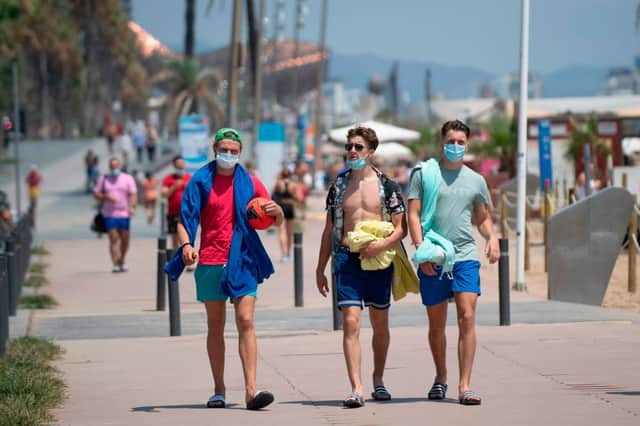Spain could bring back Covid face mask rules before summer holidays


Tourists heading to Spain this summer could be faced with strict Covid rules, as the rising case numbers in the country could see restrictions brought back in.
Compulsory face masks in indoor spaces could be reintroduced to help tackle the rising infections, with popular holiday spots including the Canary Islands and Costa del Sol saying the measure needs to be kept on the table.
Advertisement
Hide AdAdvertisement
Hide AdAt the moment, visitors are being advised to be cautious and wear a face mask indoors if they choose.
What are Spain’s current rules on face masks?
Face masks are still required to be worn by anyone over the age of six in the following circumstances in Spain:
- on any form of public transport
- visiting a hospital or medical centre, including other healthcare settings such as dentists, opticians, pharmacies
- visiting a care or nursing home
The Spanish government also recommends using face masks in the following settings:
Advertisement
Hide AdAdvertisement
Hide Ad- enclosed public spaces, such as shops, cinemas, bars and restaurants
- at large events, such as concerts, sporting events
- when in the company of people considered clinically vulnerable or high-risk and social distancing of 1.5m
- cannot be observed
- at family gatherings
- in any other enclosed communal spaces open to the public
Could indoor face mask rules be reintroduced?
The Spanish government has not yet made face masks compulsory in all indoor public spaces again after the rule was lifted in April for bars, shops and restaurants, but it has not been ruled out.
Amós García Rojas, head of the epidemiology section of the general directorate of public health of the government of the Canary Islands, said he has not rejected the idea of demanding masks be worn again indoors “to protect the vulnerable”.
Advertisement
Hide AdAdvertisement
Hide AdHe said: “The pandemic is not gone. It is necessary to continue maintaining certain restrictions and care, perhaps in the obligation to wear a mask indoors, if the situation does not improve."
Mr Rojas blamed the recent rise in cases on several factors, including a relaxation in social rules and the staging of some mass events.
He added: "To all this must be added the appearance of new variants of Covid, which have more transmissible characteristics, which cause many more infections, but fortunately are also less virulent, most are mild or asymptomatic."
He stressed that the current situation "is not as dramatic" as in other waves thanks to Covid vaccines which have managed to "modulate the negative impact" that the pandemic has had.
Advertisement
Hide AdAdvertisement
Hide AdHe urged everyone to get vaccinated and for those who are in contact with vulnerable people to wear masks.
Mr Rojas also said it is possible that mandatory face masks could return in the future if infections carry on rising, adding that if things continue as they are “we will have to act accordingly”.
He also warned against large parties in popular Spanish resorts over the summer, saying: “The massive parties that are taking place in Tenerife and Gran Canaria will lead to more infections. If the situation is not redirected, measures will have to be taken."
Elsewhere, on the Costa del Sol the mayor of Malaga is backing the return to masks indoors to stop the "acceleration" of infections.
Advertisement
Hide AdAdvertisement
Hide AdFrancisco de la Torre warned: "Otherwise, we are going to have a summer with many health problems that will affect the well-being and lives of many."
He believes it "necessary" to go back to wearing masks indoors and keeping the windows open "always" in the face of the recent "acceleration" of Covid infections.
Spain's Minister of Health Carolina Darias also said people should consider wearing masks indoors again to protect against Covid given the increase in infections and hospital admissions.
She warned: "We know from other countries, such as Portugal, that we are facing omicron sublineages that are more transmissible but less serious in relation to previous stages.”